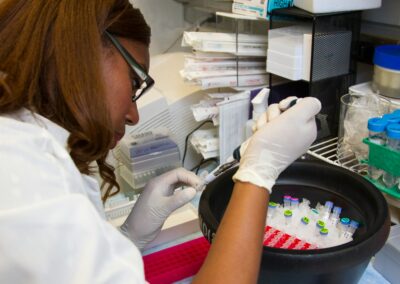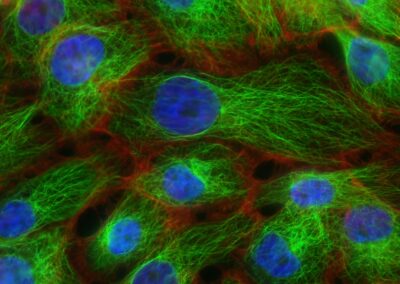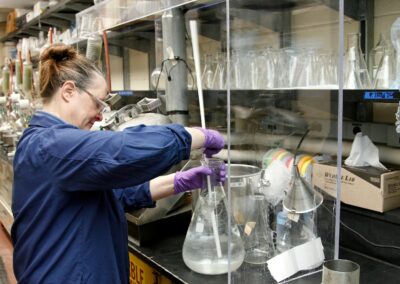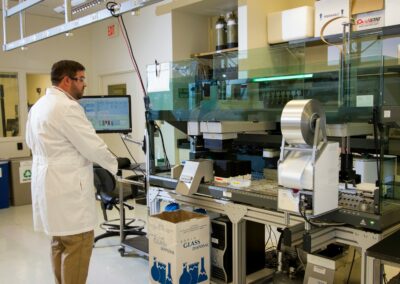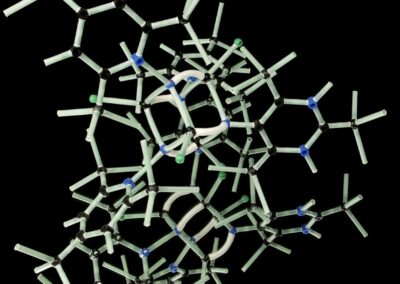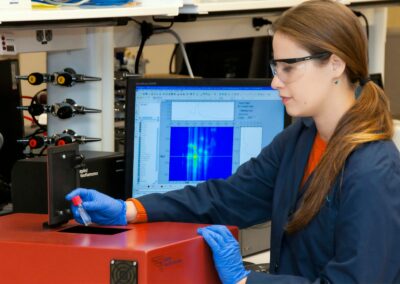The Fundamentals of DNA-Based Computation
Understanding DNA-Based Computation
The focus on DNA-based computation for complex calculations is a groundbreaking approach to data processing, particularly relevant for the innovative regions of Saudi Arabia and the UAE. This method leverages the unique properties of DNA molecules to perform sophisticated computational tasks, offering significant advantages over traditional electronic computing systems.
DNA-based computation uses the biological processes of DNA to store and manipulate information. DNA, the molecule that carries genetic instructions in living organisms, can be harnessed to perform calculations by exploiting its ability to form complex structures and perform parallel processing. This allows for highly efficient and scalable data processing, making it ideal for applications that require handling vast amounts of data quickly and accurately.
In cities such as Riyadh and Dubai, where technological advancement is a strategic priority, the adoption of DNA-based computation can drive substantial innovation. This technology’s potential to revolutionize various sectors, from healthcare to artificial intelligence (AI), aligns with the strategic goals of these forward-thinking nations, fostering a culture of innovation and technological leadership.
Key Principles of DNA-Based Computation
DNA-based computation relies on the principles of molecular biology to perform data processing tasks. The fundamental unit of computation in this system is the DNA strand, which can encode information through the sequence of its nucleotides (adenine, thymine, cytosine, and guanine). These sequences can be manipulated using various biochemical techniques to perform logical operations and store data.
One of the key principles of DNA-based computation is its ability to perform parallel processing. Unlike electronic computing, which processes information sequentially, DNA molecules can simultaneously perform multiple computations. This parallelism significantly increases the computational speed and efficiency, making DNA-based systems well-suited for tasks that require extensive data analysis and pattern recognition.
Another crucial principle is the high-density data storage capability of DNA molecules. DNA can store a vast amount of information in a very small physical space, enabling the creation of ultra-compact storage solutions. This is particularly beneficial for applications in fields such as genomics and personalized medicine, where large datasets need to be stored and processed efficiently.
Applications of DNA-Based Computation
The potential applications of DNA-based computation are vast and varied. In the healthcare sector, this technology can revolutionize the way medical data is processed and analyzed. By leveraging DNA-based systems, healthcare providers can develop more accurate diagnostic tools and personalized treatment plans, improving patient outcomes and reducing healthcare costs.
In the field of artificial intelligence, DNA-based computation can accelerate the training and deployment of machine learning models. The ability to perform parallel processing allows for faster analysis of large datasets, enabling more efficient development of AI applications. This can drive innovation in various industries, from finance to transportation, where AI is increasingly being used to enhance decision-making and operational efficiency.
Moreover, DNA-based computation can contribute to advancements in environmental monitoring and sustainability. By utilizing DNA sensors to detect and analyze environmental changes, researchers can develop more effective strategies for managing natural resources and mitigating the impact of climate change. This aligns with the sustainability goals of Saudi Arabia and the UAE, contributing to the development of smart and sustainable cities.
Implementing DNA-Based Computation in Business Strategies
Leadership and Management Skills for DNA-Based Computation Integration
Effective leadership and management are essential for the successful integration of DNA-based computation into business strategies. Leaders in Saudi Arabia and the UAE must develop a comprehensive understanding of this emerging technology and its potential impact on their organizations. This involves staying informed about the latest advancements in DNA-based computation and fostering a culture of innovation and continuous learning.
Leadership development programs focused on technology management can equip executives with the skills needed to drive the adoption of DNA-based computation. These programs should cover strategic planning, change management, and innovation leadership. By fostering a culture of adaptability and forward-thinking, leaders can ensure that their organizations are well-positioned to capitalize on the opportunities presented by DNA-based computation.
Moreover, effective communication and stakeholder engagement are crucial for gaining buy-in and support for DNA-based computation initiatives. Leaders must articulate the value proposition of DNA-based computation clearly and address any concerns or resistance that may arise. By fostering a collaborative environment, leaders can ensure that their teams are motivated and equipped to embrace the changes brought about by this transformative technology.
Project Management for DNA-Based Computation Implementation
Project management plays a critical role in the successful implementation of DNA-based computation systems. Given the complexity and novelty of this technology, meticulous planning and execution are essential. Project managers must coordinate diverse teams, manage resources effectively, and ensure that all aspects of the project are aligned with the strategic objectives.
Implementing DNA-based computation requires a multidisciplinary approach, involving experts in molecular biology, chemistry, engineering, and business strategy. Project managers must facilitate collaboration among these experts, fostering an environment of shared knowledge and innovation. This collaborative approach is essential for addressing the technical and organizational challenges associated with integrating DNA-based computation technologies.
Continuous monitoring and evaluation are also crucial for ensuring the success of DNA-based computation projects. By regularly assessing progress and performance, project managers can identify potential issues early and take corrective action. This proactive approach ensures that projects remain on track and deliver the desired outcomes, driving business success in the dynamic markets of Riyadh and Dubai.
Conclusion
DNA-based computation presents a transformative opportunity for creating more efficient and scalable data processing systems. For businesses in Saudi Arabia and the UAE, adopting this cutting-edge technology can lead to significant improvements in efficiency, accuracy, and innovation. Effective leadership and advanced project management skills are essential for successfully integrating DNA-based computation into business strategies and maximizing its benefits.
As the adoption of DNA-based computation continues to grow, businesses must remain agile and proactive in their strategies. By investing in leadership development and fostering a culture of innovation, organizations can navigate the complexities of this emerging technology and achieve long-term success. The future of data processing lies in the principles of DNA-based computation, and those who embrace this innovation will lead the way in transforming industries and enhancing business performance.
—
#DNABasedComputation #ComplexCalculations #DataProcessing #AI #SaudiArabia #UAE #Riyadh #Dubai #ModernTechnology #BusinessSuccess #LeadershipSkills #ManagementSkills #ProjectManagement








